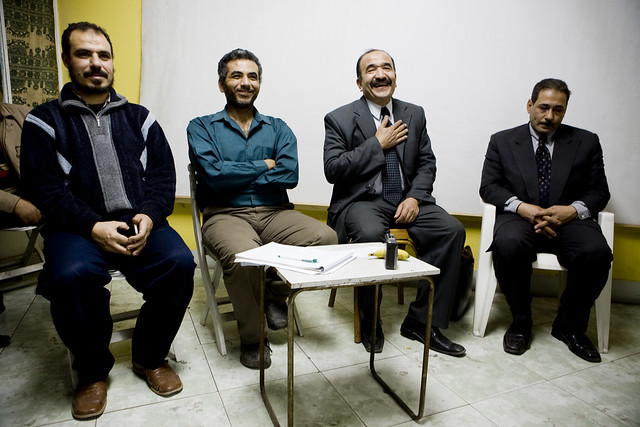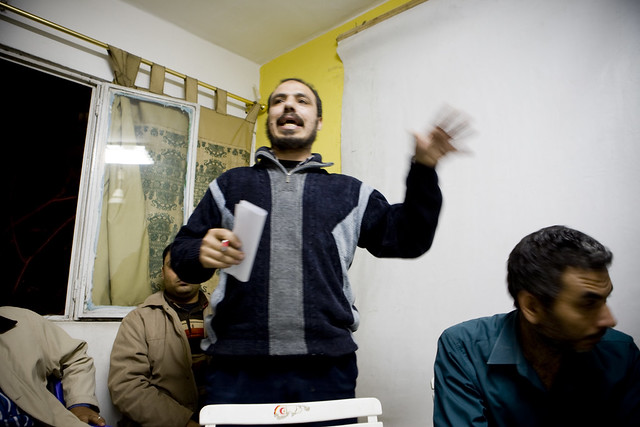Reuters published a report, where I’m interviewed, on the labor movement, titled “Egypt workers fight for pay, not against the state”:
Striking Egyptian workers are unlikely to escalate demands for better conditions into a political challenge to the government, but stoppages will make state assets less attractive to investors.
Worker frustration with rising prices and shortages of subsidised bread flared into two days of clashes with security forces in this pot-holed city north of Cairo in April last year.
The tough security response and the government’s offer to hike some wages highlighted official concerns about an escalation of discontent in a country where a fifth of the 77 million people live on less than $1 a day.
More than a year later strikes continue unabated, but political opposition groups seeking to capitalise on worker grievances have failed to broaden action into a wider protest against the rule of Hosni Mubarak, president since 1981.
“Not a single political party has the power, even the Muslim Brotherhood … (to) stop or push the strike wave forward,” labor activist Hossam el-Hamalawy said.
He said the Brotherhood, Egypt’s biggest opposition group, had limited organized support among workers and political activists using the internet had failed to rally workers.
“Workers aren’t just going to wake up and go on the internet and read that some Facebook activist called for a general strike and obey that, it doesn’t work that way,” Hamalawy said.
Mostly leftist and liberal activists agitated for a general strike in solidarity with Mahalla el-Kubra workers. Most workers ignored the calls and the Brotherhood did not take part.
LABOUR UNREST
“Each (political group) is trying to influence people for their ideology,” said Gehad Taman, a labor organizer at a textile mill in Mahalla el-Kubra, adding that efforts by political activists had mainly undermined worker claims.
Years of authoritarian rule have weakened opposition groups and, analysts say, added to apathy among many Egyptians.
But labor unrest has become common. Even professional groups like doctors, pharmacists and lawyers have stopped work or threatened strikes over pay.
Factory workers have been at the forefront as a cabinet of reform-minded ministers, appointed in 2004, revived a programme of sell offs, stoking worries about job security and pensions.
The action has often been organized outside official trade federations which many workers see as allied to the ruling National Democratic Party, which dominates Egyptian politics.
No big state firms have been sold since a bid to offload Banque du Caire failed to receive high enough bids in June last year. But once the world economic climate improves any new sales may find investors more wary as long as strikes continue.
“Labour unrest feeds into a certain amount of caution in foreign investors,” said EFG-Hermes economist Simon Kitchen.
“The unrest is a symptom of over-staffing and poor management and that is what perhaps would deter the foreign investor,” he added.
Egypt has sought to draw investment based on its location between Europe and Asia, and by offering lower labor costs.
“Our labor code allows these strikes to happen,” Investment Minister Mahmoud Mohieldin said, but added demands were modest.
SLIDING DEMAND
Speaking to reporters this month, he said strikes mostly hit state or recently privatised companies and blamed a surge in commodity prices, which has now eased, for the 2008 unrest.
Inflation peaked at 23.6 percent in August last year, but has tumbled to around 10 percent amid a world downturn.
Firms are trying to convince workers that, amid sliding demand for exports, now is not the time for industrial action.
“Strikes are not acceptable under the current circumstances,” Khaled Mahfouz, a spokesman for Mahalla el-Kubra’s Misr Spinning and Weaving, told Reuters. “Our sales have suffered in this crisis as we deal with world exports.”
The average annual salary for workers at Misr Spinning and Weaving, the largest textile manufacturer in Africa and the Middle East, was 15,000 Egyptian pounds ($2,682) in 2007-08, versus 8,500 pounds in 2002-03, Mahfouz said.
The call for worker restraint was echoed by the president in a speech to mark this year’s May Day labor holiday.
“If employers accept some losses or a fall in profits, then laborers have to cooperate with them in these difficult times in a manner that preserves their establishments and preserves the opportunities for honest work they offer,” Mubarak said.
But he also urged business leaders to avoid ostentatious displays of wealth, a nod to concerns often cited by Egypt’s struggling workers and the poor that economic reform may have generated growth but the benefits have not trickled down.
While my quotes mentioned above were correct, I agree with Per that the conclusions I’d draw would have been different. Workers are refraining from the the existing “political parties,” but that doesn’t mean their fight is not “political” or is not a direct “political” challenge to the state. On the contrary I see the strikes to be increasingly getting politicized–A politicization, that is not necessarily manifested in the conventional political manner: parliamentary voting behavior, membership in political parties, or adopting the Kefaya agenda, etc.

